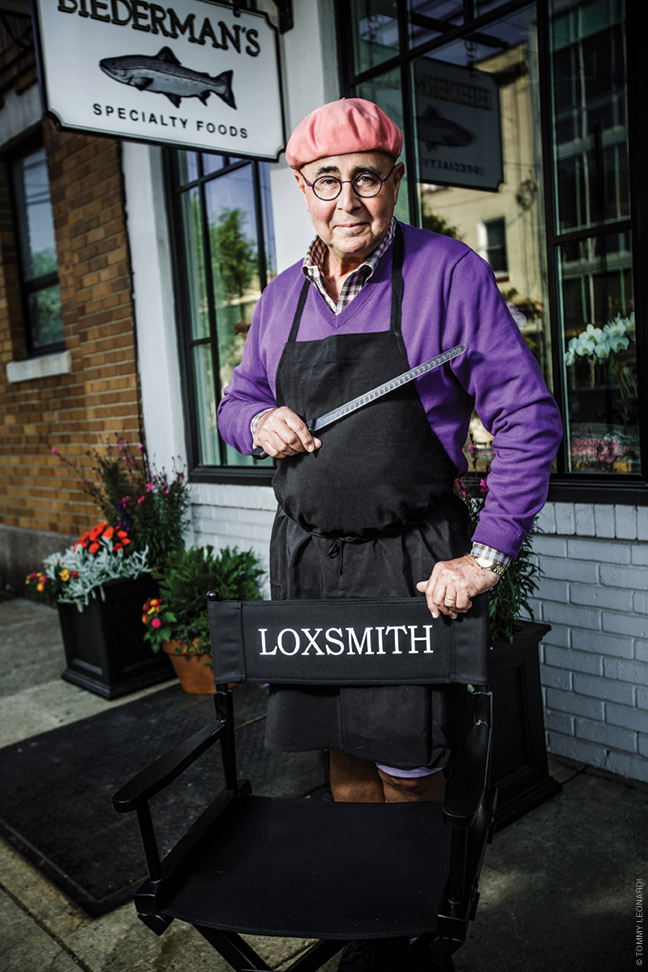
How “an old Jewish guy with good knife skills” found his smoked fish calling.
“Honestly, I don’t know how I’d manage here without my loxsmith.”
So marvels Lauren Biederman, the 25-year-old proprietor
of the eponymously named shop she
opened early this year in South Philadelphia’s Italian Market, referring
to her ace employee
Eugene “Gene” Mopsik W’70.
For the 72-year-old Mopsik, who never expected to be spending his “retirement” slicing lox, the feeling is mutual. “Lauren deserves a tremendous amount of credit for successfully launching a business in the pandemic,” he says, “and, not incidentally, for giving me a good reason to get up in the morning.”
Modeled after the classic New York “appetizing store” that serves up Jewish comfort dishes to go, Biederman’s Specialty Foods often attracts a long line of happy noshers drawn by delicacies like pastrami lox, blinis with crème fraiche and salmon roe, and Mediterranean-style beet salad. And Mopsik has been a significant factor in its early success, says the young proprietor.
“Gene is so much more than a food-prepping employee,” she says. “He’s more like an advisor, an associate, a brainstormer. Really, he’s my Mensch Cuisine and guardian angel.”
The two found each other by a happy accident. Mopsik happened to pass by the store a couple weeks before it opened, and “got to talking with Lauren about the joys of Jewish appetizing shops in New York, and my own lifelong interest and experiences prepping that food. At the end of our conversation I suggested that if she could use an ‘an old Jewish guy with good knife skills’ to carve the lox, do some cooking, and add some ‘ethnic authenticity’ to the place, she should ring me up.”
Two weeks later, after someone else didn’t work out, Biederman did just that. “Best move I ever could have made,” she says.
Mopsik has broadened Biederman’s offerings with his own recipes for soups, spreads, salads, pickles, puddings, and more. His mushroom barley soup is a consistent crowd pleaser. So is a salmon quiche—which Mopsik claims “came to me in a dream.”
A ridiculously early riser, Mopsik “regularly shows up at the shop two hours before I do, to start prepping things,” says Biederman. “His work ethic is amazing, and he’s been so helpful in getting my vision going. Gene has even arm-twisted friends to make stuff I need—like custom-fit cutting boards—and then gives them food in return, creating a barter system. Even on his days off he’s there to fuss with his lilies on the windowsill and the flowerpots outside.” Biederman also consistently marvels at Mopsik’s “great people skills” with customers.
“When we first opened, people were coming in and seeing how he artfully slices and arranges the lox and makes the matzoh ball soup,” she says. “They’d say ‘How long have you been doing this deli thing—all your life, right?’ And Gene would reply, ‘Oh, about two weeks.’”
Mopsik spent most of his adulthood in photography. He got hooked as a sophomore at Penn, where he worked as a photographer for The Record, the University’s undergraduate yearbook. “Once the seasoned staffers decided you were good enough, they’d give you all the hands-on help and materials you could possibly need—a key to the well-equipped darkrooms, unlimited access to film, developing and printing supplies,” he remembers. “For a kid with not much money, it was like I’d won the lottery.” (As a senior in 1970, he photographed outgoing Penn President Gaylord P. Harnwell Hon’53 for the Gazette’s cover, and he went on to shoot “a bunch more fun assignments” for this magazine after graduating.)
He launched his career in the seemingly glam world of rock concert and fashion and celebrity photo shoots, before gravitating to the more stable realms of industrial/commercial photography, working with advertising agencies and corporate clients.
He eventually became the executive director of the American Society of Media Photographers, a trade group representing the interests of almost 7,000 of his camera-toting peers.
After retiring, Mopsik busied himself serving on the boards of nonprofits like Philadelphia’s Fabric Workshop and Museum and the American Society of Collective Rights Licensing (which he helped create). “But lately,” he says, “I’d been itching to do something more, something fun that could get me out of the house.”
Mopsik has always found creative refuge in the kitchen. He’d don his proverbial chef’s toque “even when my wife and kids were down the shore in Stone Harbor,” where the Mopsik clan keep a place year-round and he used to have lots of time for sailing. But not this year. Instead of spending five days by the water and two in Philly, his typical summer week schedule “will likely be reversed,” he says. “No problem. I’m loving this.”
He also has some prior history in commercial-scale Jewish cooking. During summer breaks from Wharton, he earned tuition money by toiling in the kosher kitchen of a Jewish sleepaway camp. That’s where he first mastered the fine art of brining pickles (gotta have a salt-measuring hydrometer, he says), making matzo balls (first refrigerate the dough, then form), and slicing serious poundage of smoked fish without getting carpal tunnel syndrome.
What about the wear and tear on his 72-year-old body from eight hours in the shop, five days a week? “Taking on this gig has actually been good for my health,” Mopsik says. “I’m working my arm muscles, my legs are stronger because I’m on my feet, and my weight is down since I’m not snacking all the time. And I’m having great fun on the job. I love making and talking about the food, telling jokes, [and] teaching Lauren Yiddish expressions.”
—Jonathan Takiff C ‘68

